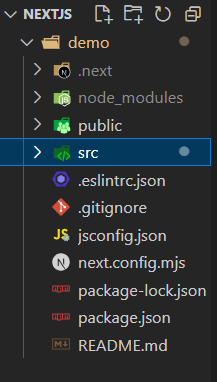
|
|
In Next.js, getting query parameters from the URL involves extracting key-value pairs from the URL string to access specific data or parameters associated with a web page or application, aiding in dynamic content generation and customization. To get query parameters from the URL in next.js we have multiple approaches mentioned below: Prerequisites:Understanding Query ParametersBefore diving into implementation, let’s understand what query parameters are. Query parameters are key-value pairs appended to the end of a URL, separated by a question mark (?) and ampersands (&). For example, in the URL https://example.com/products?id=123&category=electronics, id and category are query parameters. Steps to Create a NextJS applicationStep 1: First create a folder and navigate to that folder. mkdir nextJS
cd nextJS Step 2: Now, create a nextJS application using the following command. npx create-next-app demoProject Structure: nextJS Structure The updated dependencies in package.json file will look like this. "dependencies": {
"react": "^18",
"react-dom": "^18",
"next": "14.2.1"
},Using useRouterTo get query parameters from a URL in Next.js using useRouter, import useRouter from next/router, call it inside your functional component, and access the query object. This enables easy extraction of URL query parameters. Example: Implementation to show how to get query parameters from the URL using useRouter. Output:  getting params Using useSearchParamsIn Next.js, you can use the useSearchParams hook from the next/navigation package to access query parameters from the URL within functional components. By utilizing the .get method provided by useSearchParams, you can retrieve the value of specific query parameters. Ensure that the parameter names used with .get match those in the URL query string for accurate retrieval. Example: Implementation to show how to get query parameters from the URL using useSearchParams. Output:  query params using useSearchParams Example 2: Implementation to show how to get query parameters for multiple unknown params. Output:  multiple parmeters using useSearchParams Using getInitialPropsIn Next.js, the getInitialProps method is utilized within page components to fetch data and pass it as props before rendering, essential for server-side rendering and pre-rendering pages. It enables data fetching from APIs, server-side rendering, SEO enhancement, and dynamic content generation by handling query parameters efficiently. Example: Implementation to show how to get query parameters from the URL using getInitialProps. Output:  getting queries from getinitialProps Using getServerSidePropsgetServerSideProps in Next.js serves a similar purpose to getInitialProps, allowing data fetching before page rendering. It dynamically fetches data on each request, enhancing server-side rendering, SEO, and performance. With its ability to handle query parameters effectively, it enables dynamic content generation and personalized user experiences. Example: Implementation to show how to get query parameters from the URL using getServerSideProps. Output:  getting queries from getinitialProps ConclusionIn a Next.js application, the useRouter and useSearchParams hooks provide powerful solutions for accessing and processing URL query parameters within functional components. These hooks enable seamless integration of URL parameters, facilitating dynamic workflows and simplifying parameter management. |
Reffered: https://www.geeksforgeeks.org
| ReactJS |
Type: | Geek |
Category: | Coding |
Sub Category: | Tutorial |
Uploaded by: | Admin |
Views: | 16 |